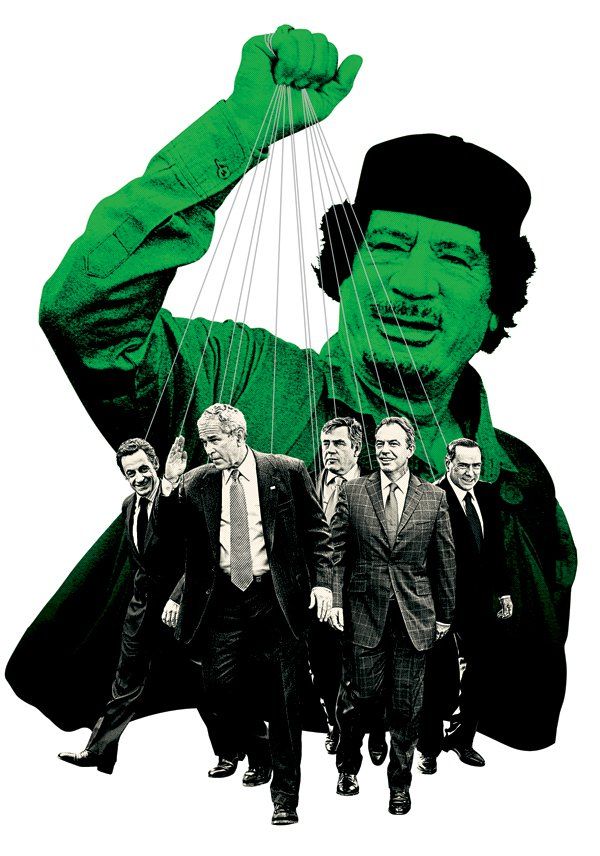
The tale is a sordid one, but let's at least begin in relatively pleasant surroundings, among the leather armchairs of the Travellers Club in London. Its rooms have been a favorite rendezvous since the 19th century for gentlemen of international intrigue—and it's where Libya's urbane, white-haired spymaster, Musa Kusa, met with representatives of the British and American intelligence services in December 2003. Their purpose was to hammer out a deal to bring Kusa's boss, Muammar Gaddafi, in from the cold.
Kusa, now Libya's foreign minister, affects none of the silly props and pretenses—the tents and turbans and meandering rants—that have become Gaddafi's trademarks. He got his master's degree at Michigan State University in the 1970s, and both his children, born in the United States, are American citizens. "He ought to understand our ways," says an American intelligence officer who dealt with him in the 1990s. And he does. It's Kusa's grasp of Western ways that has made him so effective in his primary role as Gaddafi's enabler, aiding and abetting the Libyan leader's pathological behavior. Kusa concocts excuses, fends off consequences, comes up with compromises, and thus far has managed to keep his kinsman in power no matter what crimes the Libyan leader has committed against his own people or against the world. But what's really disturbing is the roster of world leaders he helped to enlist as his fellow enablers: men like Tony Blair, Nicolas Sarkozy, Silvio Berlusconi, Gordon Brown, and even George W. Bush.
How did they end up collaborating with the once and future international pariah? The West's reconciliation with Gaddafi disconcerted even the likes of former CIA director George Tenet, whose memoir, At the Center of the Storm, called the negotiations with Kusa "illustrative of the surreal world in which we had to operate." According to Tenet, many in the agency actually suspected Kusa of masterminding the 1988 bombing that blew Pan Am Flight 103 out of the sky over Lockerbie, Scotland, killing 270 people. But by 2003, Western intelligence services had grown as comfortable with Kusa's proposals as they were in the leather armchairs of the Travellers—and they helped Western leaders feel that way, too.

It was a deal none of them could resist. Libya's oilfields would be fully opened up to the West, and U.S. and European banks and corporations could resume tapping the country's revenue stream. And Gaddafi would publicly renounce his putative nuclear-development program (much of which had never even been uncrated). Having invaded Iraq in search of nonexistent weapons of mass destruction, the Bush administration could claim that in Libya, at least, its efforts were bearing fruit. The plan seemed to have something for everyone—everyone, it eventually turned out, except the Libyan people.
Kusa's rehab campaign relied heavily on the West's craving for Libya's oil and cash, but he used other levers as well. For one thing, there was the weakness of some democratic leaders for useful tyrants—the kind who could gather intelligence on Al Qaeda in ways that might make many Americans squeamish, as Gaddafi did for Bush, and who could forcibly stem the flood of illegal immigrants across the Mediterranean to Italy, as Gaddafi did for Berlusconi. The regime offered some grand gestures, in addition: $10 million for each of the families that lost someone at Lockerbie; the surrender of the accused bombers to face trial in the Netherlands; and when that wasn't enough to win full acceptance by Washington, the much-touted nuclear deal. And the regime trotted out one of Gaddafi's sons as its unofficial spokesman—the British-educated Saif al-Islam, a relatively charming fellow by comparison with the old man.
The strategy worked brilliantly for all participants—until recently, anyway. The deal doesn't seem to have hurt the negotiators, either. Take Mark Allen of Britain's foreign intelligence agency MI6; he worked closely with Kusa before leaving government service a few months after the Travellers meeting. He's now Sir Mark Allen, a highly paid adviser to BP. (Allen's office declined to make any comment on his role.) Or Stephen Kappes, one of Kusa's key contacts at the CIA, according to Tenet and other agency officers. He rose to become the agency's deputy director before his sudden retirement last year.
Big oil prospered. The American firm Occidental wound up with more acreage than any other corporation in Libya, but the big winners were BP and the Italian national oil company ENI. Italy buys some 80 percent of Libya's petroleum, and Berlusconi warmly welcomed Gaddafi on 11 state visits to Rome, each more bizarre than the last. Of particular note were the lectures on Islam the Libyan leader delivered to audiences of hundreds of young women who were hired by a modeling agency for the purpose. As oil prices skyrocketed, Gaddafi and his family suddenly had more money than they knew what to do with. In 2006, belatedly emulating other big oil producers, they created a sovereign wealth fund, the Libyan Investment Authority, and started buying interests in everything from Pearson, which owns the Financial Times and The Economist, to major banks and even the Juventus football team in Italy.
But by the end of the decade, Kusa's carefully constructed house of cards had started to fall apart. The old man and the sons were increasingly out of control. One early indication came in 2007, when Saif al-Islam talked openly to NEWSWEEK about the way his father's regime had used "blackmail" to get what it wanted from the newly elected French government of President Nicolas Sarkozy. At stake were the lives of five Bulgarian nurses and a Palestinian doctor who had been imprisoned for eight years, at that point, and sentenced to death on the trumped-up charge that they had intentionally infected more than 400 Libyans with AIDS. Sarkozy outbid other Europeans to win the medics' freedom, Saif explained. Cash payments, vast medical facilities, a nuclear reactor, uranium mining, and military equipment were part of the package, said Saif.
But the really critical moment of excess came in 2009. Abdelbaset al-Megrahi, the sole Libyan intelligence officer convicted for the Lockerbie bombing, was serving a life sentence in Scotland, but had been diagnosed with terminal prostate cancer, supposedly with three months to live. The Libyans, who had stalled a vast oil deal with BP (where Sir Mark Allen worked) let the government of then-prime minister Brown know in no uncertain terms that they wanted to be able to be repatriate prisoners—they didn't have to be specific about which ones—held in British jails. When Megrahi was sent back to Tripoli, he was greeted as a hero. And BP's $900 million deal was safe. Saif didn't bother to disguise the ransom deal. Megrahi's release was always on the table, he said. Kusa's role in the release is unclear. After all, when Kusa was deputy director of the Libyan intelligence service in 1988, Megrahi had been one of his men.
Whether he objected to the Megrahi gambit or promoted it, Kusa was kicked upstairs in 2009 to become foreign minister, where his diplomacy, conducted in public, would be more pro forma than proactive. Now his carefully constructed web of enablers is unraveling by the hour. In the first weeks of the Libyan uprising, Kusa still took calls from British Foreign Minister William Hague, among others. But Kusa has stopped answering the phone, according to the U.S. State Department. Has he given up, or gone back into the shadows where he was always most effective? Do the Americans and Europeans still want to talk to him? One clue: dozens of Gaddafi kin and colleagues have had their assets frozen by the U.S. Treasury Department—but not Kusa. Having enabled Gaddafi's survival for so long, Kusa may have cut a deal, at last, for his own.
With John Barry in Washington, Barbie Nadeau in Rome, and R. M. Schneiderman in New York
Uncommon Knowledge
Newsweek is committed to challenging conventional wisdom and finding connections in the search for common ground.
Newsweek is committed to challenging conventional wisdom and finding connections in the search for common ground.
About the writer
To read how Newsweek uses AI as a newsroom tool, Click here.








